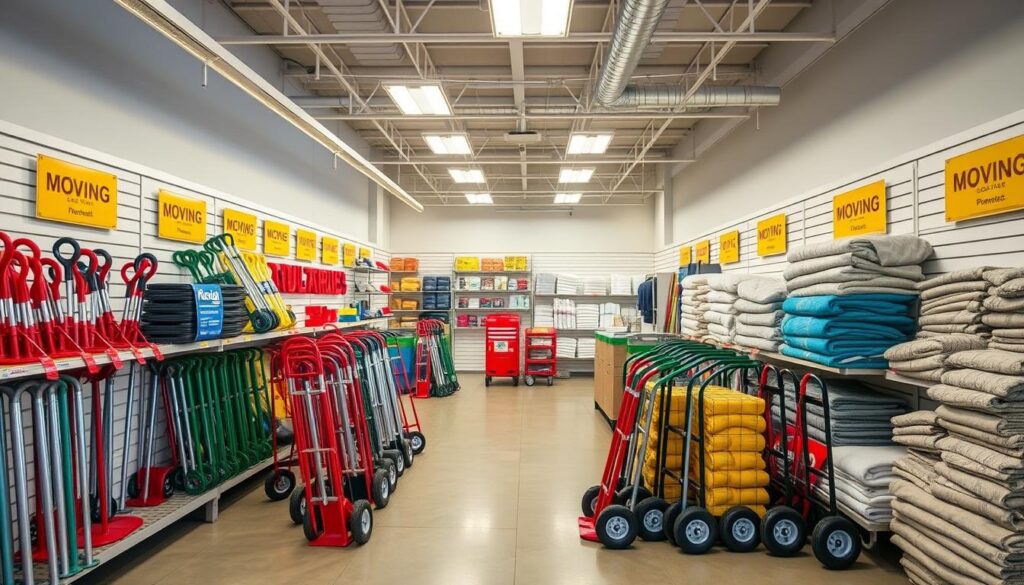How do you move at low cost?
Get Your Free Moving Estimate
Moving doesn’t have to break the bank. At HeavenlyMove, we understand the importance of sticking to a budget while ensuring that your belongings are transported safely and efficiently. With over 20 years of experience and a commitment to customer satisfaction, we are here to guide you through the process of a cost-effective move. In this article, we will share practical tips and strategies that leverage our expertise, making your move as seamless as possible, without compromising on quality or reliability. Whether you’re searching for affordable moving services or exploring budget-friendly moving options, our insights will pave the way for a successful transition.
Key Takeaways
- Affordable moving services can help you stick to your budget.
- Planning is essential for a smooth, low-cost move.
- Consider downsizing to simplify the moving process.
- Utilize budget-friendly moving options like rental equipment.
- Research multiple moving companies to find the best rates.
- Timing your move wisely can lead to significant savings.
- Avoid common mistakes to keep your moving costs down.
Understanding Low-Cost Moving Options
When planning a move, exploring low-cost moving options can greatly impact your budget. This approach allows us to save money while still receiving quality service. Making informed choices enables us to optimize our resources effectively without sacrificing our moving experience.
Why Choose a Low-Cost Move?
Opting for a low-cost move presents numerous advantages:
- Significant savings on moving expenses
- Access to inexpensive relocation solutions that still meet our needs
- Affordable moving strategies can make the process less stressful
The goal is to balance cost with quality, ensuring we enjoy a successful transition to our new home.
Factors Affecting Moving Costs
Understanding the key factors affecting moving costs will assist us in making informed decisions:
| Factor | Impact on Cost |
|---|---|
| Distance | Longer distances typically incur higher costs |
| Time of Year | Peak seasons may lead to increased rates |
| Size of Household | More items result in higher transportation costs |
| Add-ons | Extra services can elevate the total cost |
By being aware of these aspects, we can navigate our options with greater clarity, making decisions that align with our financial goals.
Planning Your Move Efficiently
Efficient planning contributes significantly to a successful move. Our approach includes essential components such as checklists and timelines, which ensure a smooth and organized process. By implementing cost-effective moving tips, we can navigate the challenges of both local and long-distance relocations.
Creating a Moving Checklist
A comprehensive moving checklist is an indispensable part of planning your move efficiently. This list acts as your roadmap, guiding you through all necessary tasks step by step. Be sure to include:
- Gathering packing supplies
- Setting a moving date
- Notifying utility companies
- Updating your address
- Scheduling donation pickups
Maintaining clarity and keeping everything organized allows for smart budget planning throughout the process.
Timelines for Budget Moves
Establishing a clear timeline can greatly impact your moving experience. Start by allowing sufficient time for each task, regardless of the move’s scale. We suggest a general timeline:
| Timeframe | Task |
|---|---|
| 8 Weeks Before | Begin sorting and decluttering |
| 6 Weeks Before | Decide on a moving method (DIY or movers) |
| 4 Weeks Before | Start packing non-essential items |
| 2 Weeks Before | Finalize moving details (date, logistics) |
| 1 Week Before | Complete packing and prepare for moving day |
This approach emphasizes the importance of each stage for effective budget planning and stress reduction.
Local vs. Long-Distance Moves
Understanding the differences between local and long-distance moves is crucial for efficient planning. Each requires distinct considerations, including:
- Local Moves: Typically involve shorter distances, allowing for quicker transitions.
- Long-Distance Moves: Require more thorough budgeting and logistics, often needing extra time for proper planning.
By recognizing these factors, you’ll be better equipped to utilize cost-effective moving tips tailored to your unique situation.
Renting Moving Equipment
When relocating, making informed decisions about renting moving equipment can significantly impact your overall expenses. We should evaluate the advantages and disadvantages of renting versus buying. Additionally, exploring budget equipment rental options opens the door to potential savings, ensuring you have the necessary tools without overspending. Understanding these factors allows us to select the best equipment solutions that align with our moving plans.
Pros and Cons of Renting vs. Buying
Before deciding, consider the benefits and drawbacks associated with each choice:
- Renting
- Cost-effective for short-term needs
- No maintenance or storage fees
- Access to modern and varied equipment
- Buying
- Long-term investment for repeated use
- Customization and familiarity with the equipment
- Potentially higher upfront costs
Finding Affordable Rental Solutions
Several strategies exist for securing cost-effective moving solutions. Here are some ways to find the best options:
- Research local rental companies that specialize in renting moving equipment.
- Compare prices and rental terms across various providers.
- Check if they offer discounts for longer rental periods.
- Look for promotional deals during off-peak moving seasons.

By weighing these factors and actively seeking out affordable rental solutions, we not only streamline our move but also protect our budget effectively.
Utilizing Budget Moving Companies
Choosing budget moving companies can make a significant difference in your overall moving expenses. Conducting thorough research and making informed comparisons is essential to find reliable and cost-effective movers that meet your needs. This process not only ensures you receive affordable moving services but also guarantees peace of mind during your transition.
How to Research and Compare Companies
To find the right budget moving company, follow these steps:
- Check online reviews to gauge customer satisfaction.
- Request quotations from multiple movers to compare costs.
- Verify the company’s credentials and licensing status.
- Look into their experience with moves similar to yours.
Questions to Ask Before Booking
Before finalizing your choice, ask potential movers the following questions:
- What is included in the quoted price?
- Do you provide insurance options to protect my belongings?
- Can you share customer testimonials or references?
- What is your policy on delays or cancellations?
Decluttering Before You Move
Embarking on a move presents the perfect opportunity to reevaluate our possessions. Emphasizing downsizing benefits can significantly enhance the moving experience. By reducing the number of items we take with us, we can simplify our move and cut costs. Let’s explore the advantages of this process and discuss effective decluttering strategies that make efficient moving planning a reality.
Benefits of Downsizing
Downsizing offers numerous benefits that extend beyond merely lightening the load. Key advantages include:
- Lower moving costs due to decreased weight and volume of items.
- Reduced time spent on packing, loading, and unloading.
- The chance to start fresh in a new space, free from clutter.
- An opportunity to donate or sell items, supporting sustainability and community services.
Tips for Efficient Decluttering
Implementing smart decluttering strategies can transform your moving experience. Here are some practical tips to consider:
- Set clear goals for what you wish to achieve during the decluttering process.
- Sort items into categories: keep, donate, sell, or discard.
- Use the “one-year rule” – if you haven’t used an item in over a year, consider parting with it.
- Schedule regular decluttering sessions leading up to the move to avoid last-minute rushes.
Finalizing our move can lead to a newfound sense of organization and clarity. We can foster a smooth transition by embracing the idea of downsizing and committing to efficient decluttering. Ultimately, this approach not only makes moving easier but also enriches the experience in our new home.
Packing Smart to Save Money
Packing efficiently is a key strategy in any budget-conscious move. By focusing on cost-saving moving supplies and DIY packing techniques, we can minimize expenses while ensuring everything arrives safely at the new location. An organized packing process allows for smoother transitions and reduces the need for professional packing services.
Moving Supplies on a Budget
Finding cost-saving moving supplies doesn’t have to be challenging. Many options are available to help keep our packing budget-friendly:
- Utilize boxes from local retailers or grocery stores.
- Consider alternatives like suitcases and bins for heavier items.
- Ask friends or family for any spare packing materials they might have.
- Look for second-hand options on online marketplaces.
DIY Packing Techniques
DIY packing techniques can save money while providing a personal touch. Here are some effective methods:
- Wrap fragile items in clothing or towels to avoid purchasing bubble wrap.
- Label boxes clearly to streamline the unpacking process.
- Pack with a purpose by grouping similar items together.
- Use vacuum bags for clothing to save space and reduce box usage.
Organizing Your Packing Process
Organizing your packing process ensures that moving day is less stressful and more efficient. Consider these steps:
- Create a timeline for when to start packing each room.
- Prioritize packing items that are less frequently used.
- Keep essential items accessible for the first few days after the move.

Exploring Alternative Moving Services
As we dive into alternative moving services, various options emerge that can significantly ease the moving process. Embracing innovative strategies like peer-to-peer moving can enhance convenience, and opting for portable storage options allows for increased flexibility and cost savings.
Peer-to-Peer Moving Platforms
Peer-to-peer moving platforms offer a unique solution for those seeking a more personal touch in their moving experience. These platforms connect individuals who need help with their move to those looking to earn a little extra cash by assisting with heavy lifting or transportation. Some of the benefits include:
- Cost-effectiveness: Often more affordable than traditional moving services.
- Local expertise: Find movers familiar with your area and its logistics.
- Flexible scheduling: Arrange your move based on your timeline and availability.
Using Portable Storage Solutions
Portable storage options provide a practical way to manage your belongings during a move. By utilizing portable storage units, we can store items on-site or at a secure facility. The advantages include:
- Convenience: Load your items at your own pace.
- Affordability: Typically less expensive than full-service moving companies.
- Security: Units can be locked and monitored, ensuring the safety of your possessions.
| Service Type | Benefits | Considerations |
|---|---|---|
| Peer-to-Peer Moving | Cost-effective, flexible, local knowledge | Quality varies, platform reliability |
| Portable Storage Solutions | Convenient, affordable, secure | Requires space for storage units, self-management |
Timing Your Move for Cost Savings
Strategic timing can lead to significant savings during your relocation process. Understanding the best time to move involves analyzing seasonal trends and days of the week, creating a budget-friendly moving schedule. By choosing the optimal period, we can help you maximize your savings while ensuring a smoother transition.
Best Times of Year to Move
Moving costs can vary greatly depending on the season. Here are some insights into the most cost-effective times to relocate:
- Off-Peak Season: Late fall and winter months tend to have lower demand.
- Mid-Month Moves: Many people prefer the start or end of the month, making mid-month ideal for savings.
- Avoiding Holidays: Major holidays can escalate costs due to increased demand and surcharges.
Midweek vs. Weekend Moving Costs
Another important aspect of cost-saving move timing is choosing between weekdays and weekends. Here’s a quick comparison:
| Day | Typical Cost | Demand Level |
|---|---|---|
| Weekdays | Lower | Low |
| Weekends | Higher | High |
Scheduling your move for midweek can lead to a more budget-friendly moving schedule, as demand is considerably lower. By prioritizing this strategy, we can assist in reducing your overall moving expenses significantly.
What to Avoid When Moving on a Budget
Moving on a budget can be a challenging task but avoiding common pitfalls makes the process easier. By identifying typical moving budget mistakes and understanding the hidden fees, you can successfully stay on track with your financial plans. We discuss some essential budget moving tips to help you navigate this journey efficiently.
Common Costly Mistakes
- Underestimating Costs: Many tend to overlook essential expenses such as packing materials and truck rentals.
- Neglecting Timely Planning: Last-minute decisions often result in higher rates and rushed arrangements.
- Choosing the Wrong Time: Peak moving seasons lead to inflated prices, straining your moving budget.
- Overpacking: Taking unnecessary items increases weight, which can lead to higher transportation costs.
Hidden Fees to Watch For
When selecting moving services, always inquire about potential hidden fees. Some common hidden costs include:
| Fee Type | Description |
|---|---|
| Fuel Charges | Additional costs based on distance and gas prices. |
| Delivery Window Fees | Charges for expedited delivery outside of the standard timeline. |
| Storage Fees | Costs incurred if items need to be stored temporarily. |
| Extra Labor Costs | Additional charges for more movers or long carrying distances. |
Post-Move Considerations
After completing your move, it’s crucial to focus on post-move budgeting. This stage involves managing and anticipating common move-in expenses that can arise unexpectedly. By carefully calculating these costs, we can help maintain your financial stability and ensure a smooth transition into your new home.
Budgeting for Move-In Expenses
In the hustle of moving, it’s easy to overlook certain expenses that occur once you’re settled. Common move-in expenses include security deposits, application fees for new utilities, and essential household items that may need replacement. To manage these effectively, we recommend creating a detailed budget. This will allow you to estimate and allocate funds for each of these costs, preventing financial strain.
Setting Up Utilities and Services Economically
Another important aspect to consider is the economical utility setup. It’s essential to research and compare service providers to avoid excessive charges. Look for bundled services that offer value for your money, ensuring you get the best rates available. At HeavenlyMove, we are dedicated to guiding you through this process, empowering you to make informed, budget-friendly decisions even after your move is complete.


